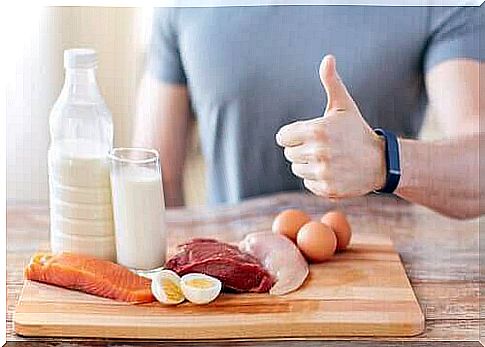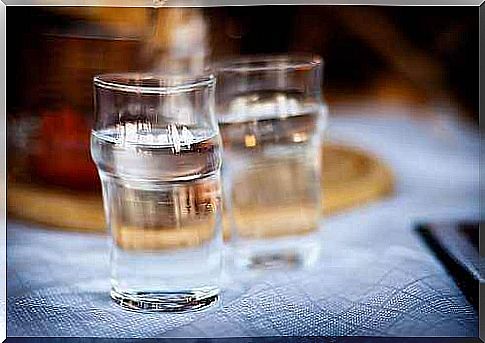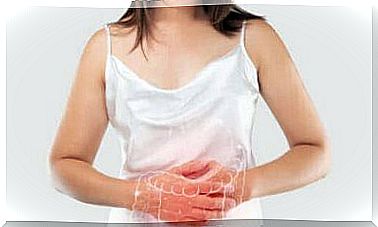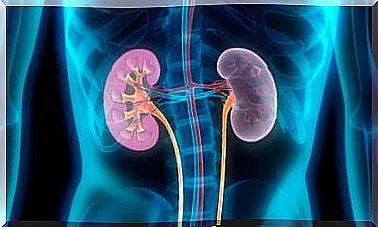Everything You Need To Know About Nutrition And Kidney Failure

People suffering from kidney failure, especially in its chronic form, need to make some dietary changes to stay healthy and reduce the accumulation of toxic substances that the kidneys are unable to remove. In this article, we discuss everything you need to know about nutrition and kidney failure.
Nutrition and kidney failure
In patients with chronic renal failure, protein-calorie malnutrition is common. It is also a good predictor of mortality and morbidity. Therefore, it is important for patients with kidney failure to meet dietary needs to prevent malnutrition.
First, you need to know that there are different degrees of the disease. These include acute renal failure, chronic renal failure and renal replacement therapy (hemodialysis and peritoneal dialysis). In this article we will share general nutritional guidelines for this disease. Nevertheless, they should be adapted to the patient’s condition.
Diet and kidney failure
The diet for kidney failure is considered strict, as these patients need to limit or eliminate several food groups. However, if the patient is on continuous dialysis, the diet is not so restrictive.
Check the amount of protein

Protein restriction in someone with moderate kidney failure slows the development of the disease. Although proteins make the kidneys work, all people need to consume them. Currently, experts recommend moderate diets with little protein if the patient is not on dialysis. In other words, 0.8 g / kg / day (60% of high biological value). If the patient is on dialysis, they need more protein.
Nutrition and kidney failure: Reduce potassium and phosphorus intake
If potassium builds up in the blood, it increases the risk of heart failure. Healthcare professionals should monitor plasma potassium levels.
Meanwhile , continuous high levels of phosphorus in the blood significantly affect bones. Protein restriction represents a phosphorus reduction. Therefore, it is important to limit the consumption of this if you have kidney problems and your doctor advises you to do so.
Ensure proper intake of calcium and vitamin D.
Usually there will be a calcium deficiency in the intestinal absorption due to vitamin D reduction. Vitamin D must be supplemented, as a deficiency can cause atherosclerosis, endothelial dysfunction or ventricular hypertrophy. In a study published in Nephrology , experts suggest that vitamin D supplements have a vascular benefit and that is why it is a good idea for those with kidney problems.
Nutrition and kidney failure: Control your salt intake
Other factors that need to be considered when it comes to nutrition and kidney failure are controlling sodium. This is because it promotes retention of fluids that the kidneys cannot remove. If the patient does not suffer from hypertension, they can only take 1000-2000 mg / day.
Limit your fluid intake

If the patient is on dialysis, they should monitor fluid intake because those undergoing this treatment usually do not urinate frequently. If they drink a lot of fluid and do not excrete it, the fluid can thus accumulate in the ankles and even in the lungs and heart. It is also recommended that patients always weigh the same weight to ensure that they do not gain weight in dialysis sessions.
Keys to nutrition in case of kidney failure
To carry out the guidelines we outlined above, it is important to keep in mind the following keys to nutrition. However, it is best to consult your doctor or nutritionist directly so that they can advise you according to your individual needs.
- The consumption of proteins found in meat, fish, dairy products and eggs should be adjusted for each patient.
- In addition, patients should control the consumption of legumes, vegetables, fruits, nuts and cocoa. This is because they contain a lot of potassium. They should do this to avoid hyperkalemia.
- When consuming vegetables, legumes or potatoes, people with kidney problems should leave them in water for three hours before cooking them. Then they should boil them a few times and pour off the boiling water each time. It is also best to sauté them after this to reduce the water content.
- Another method of consuming vegetables is to eat them frozen. You can also consume canned or cooked fruit (up to twice a day).
- In addition, it is best to eat toast because it contains less water.
- However, patients should limit their consumption of whole grains because they are rich in phosphorus and potassium.
- You should also avoid soft drinks, even if they are soft drinks with artificial sweeteners. This is because they do not eliminate the feeling of thirst properly. In addition, they are usually not so healthy!
- You should also avoid ultra-processed foods, such as powdered soups or purees, sausages, smoked meats and fish, and packaged snacks, so you can follow a low-salt diet.
- Consume whole milk products only in moderate amounts due to the amount of phosphorus they contain.
Conclusion
As you have seen, patients with kidney failure must follow a strict diet. If you suffer from kidney problems, do not hesitate to visit specialists who can tailor your diet and treatment to your needs.









